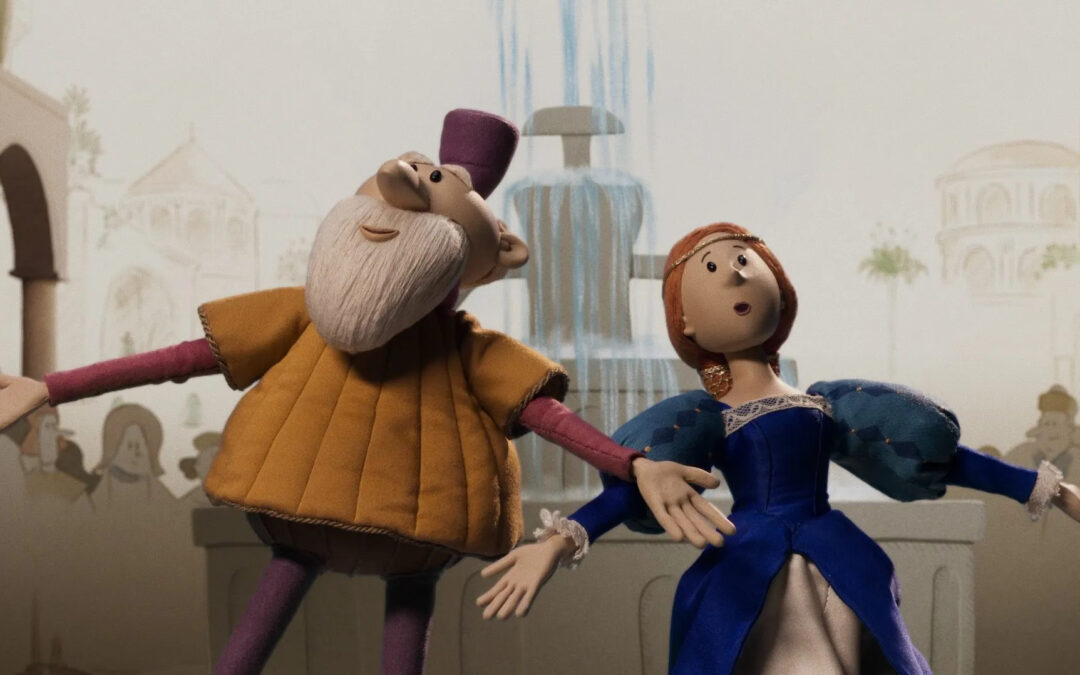Blue Fox Entertainment. 2023. Animated. 92 min.
Grade: 2 out of 4
If someone told you that the Oscar-nominated screenwriter of Pixar’s Ratatouille—who once worked in the Disney story department and would later work on Mouse House classics like The Lion King—would co-direct an unfocused and meandering animated film whose target audience is near impossible to discern, you wouldn’t believe it. Then again, there was a time when no one believed the Earth was round, a reference we mention because Magellan left Spain on his trip to prove the planet’s sphericality in 1519, the year that Italian painter, engineer, and architect Leonardo da Vinci died.
Da Vinci is the subject of The Inventor, writer and co-director Jim Capobianco’s animated examination of the Renaissance icon’s existential search for meaning during his final years. Every frame suggests The Inventor is a labor of love for Capobianco and one pitfall he fails to avoid is being so excited about his long-gestating passion project that clean storytelling takes a backseat to jamming in a greatest hits collection of da Vinci’s finest musings and sketches. Here, Capobianco presents da Vinci as not just restlessly inventive and scientifically curious but he’s also on a quest to divine the meaning of life and to search for the soul. Add to that da Vinci’s conflict with the anti-science Papacy of Italy, and the king of France who forces him to design a huge celebration to demonstrate French superiority to the kings of Spain and England, and it’s too much. Yet it’s also not enough. With light and lovely, if hardly memorable, songs by Alex Mandel killing time, and lengthy scenes where characters engage in busywork that gives the audience something to look at during dialogue dumps, the movie’s narrative doesn’t sustain itself over 92 minutes.
What sustains the film, and those who love animation, are the visuals, an intoxicating combination of Rankin-Bass stop-motion puppetry and traditional hand drawn animation. Especially effective is when Capobianco and co-director Pierre-Luc Granjon combine the two as when da Vinci, voiced by Stephen Fry, unveils his plans for an Ideal City in France filled with canals and fountains and rendered as 2D sketches. Many of these sketches are actually da Vinci’s where his flights of imagination are marvelously given the breath of cinematic life. Those flights of fancy primarily take off in France, where narcissistic King Francis I (voiced in jaunty fashion by Gauthier Battoue) has given da Vinci free reign to conduct his experiments, unlike Italy’s Pope Leo X (Matt Berry) who chafes against da Vinci using cadavers to study the human body and just wants him to be “a good little painter” like Michelangelo. Soon da Vinci gets sidetracked by King Francis’ desire for him to plan the celebration that will impress Kings Carlos V (Max Bamgarten) of Spain and Henry VIII (Daniel Swan) of Great Britain.
Every frame feels lovingly rendered but even the evocative animation can’t paper over the lack of narrative momentum and the feeling that Capobianco can’t decide if he’s making an educational film, a soulful celebration of da Vinci’s life, or an existential investigation into man’s higher purpose. In Capobianco’s script, da Vinci talks in aphorisms and bromides, while a second act turning point that hinges on the Pope proclaiming that da Vinci, “is forbidden from finding the soul” is hardly a screw turner. Much like da Vinci in the film, The Inventor is pulled in too many directions and as a result, younger viewers will only respond to the animation while older viewers will be turned off by the slack pacing and disjointed storytelling.
Capobianco cleverly tries to incorporate not only da Vinci’s sketches but also his quotes, including “There are three kinds of people. Those who see. Those who see when shown. And those who don’t see,” which is not one of his pithier musings. Even the bizarre yet true story of Francis trying to have da Vinci’s The Last Supper transported to France, still attached to the wall, is namechecked here as well. It all speaks to the genius of da Vinci’s art and wisdom which are appreciated in France by the King’s sister, Princess Marguerite (Daisy Ridley), while the King’s mother, Louise de Savoy (Marion Cotillard), prefers da Vinci use his gifts to better the reputation of France. So ultimately, the primary conflict in The Inventor is between those who’d utilize da Vinci’s talents for the advancement of art versus those who’d utilize it for war. In the middle is the Renaissance painter, depicted here as an existential Santa Claus struggling to make governments understand that science and discovery are the future, not war.
One almost feels guilty for disliking The Inventor since it has so much going for it; the animation is warm and tactile and constantly surprising (the cloud of cotton ball-dust created by two scuffling characters is especially delightful), it educates audiences about one of history’s greatest thinkers, and its concerns are far afield from the “young girl finds her identity” stories from Disney and Pixar. But much like da Vinci himself was a painter, inventor, scientist, engineer, and architect, Capobianco’s film tries to combine history, biography, science, and spirituality and as a result is a bit of a gorgeous mess.

